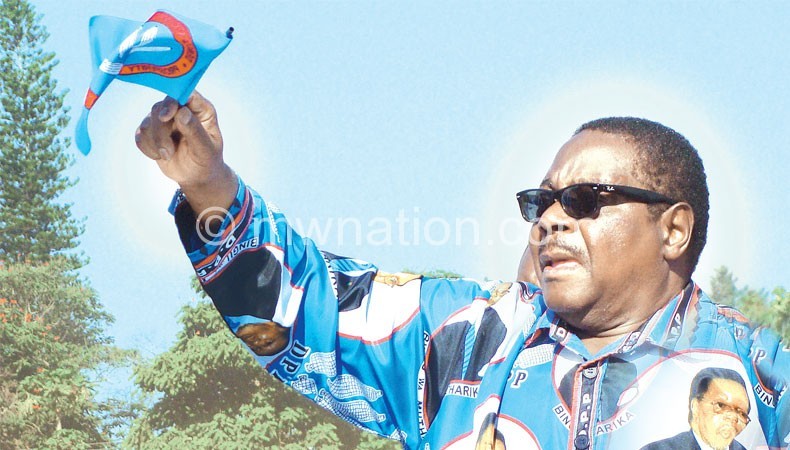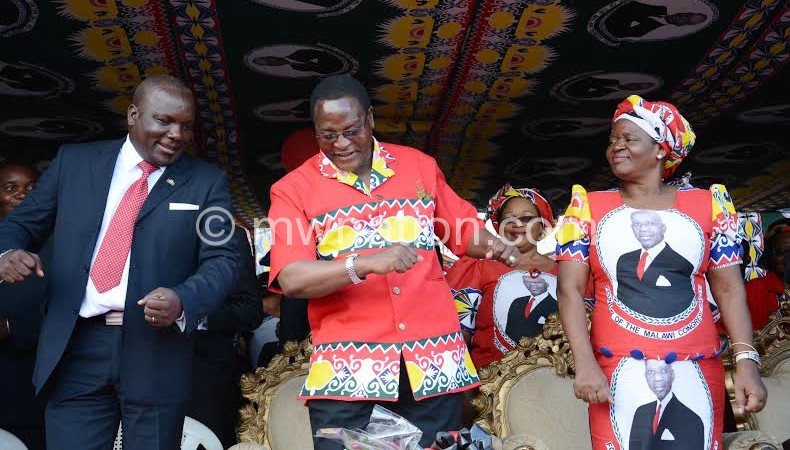Road to 2019: Assessing endorsements
It is two years now since a new government was ushered into power in Malawi. The May 20 2014 Tripartite Elections are now history, but still worth revisiting is the journey that repeated the 1994 General Elections record when a political party outside government claimed power.
Then incumbent Joyce Banda, who led the governing People’s Party (PP), lost power to Peter Mutharika of the Democratic Progressive Party (DPP).

Several factors have been attributed to the final results each of the top four political parties, namely DPP, Malawi Congress Party (MCP), PP and United Democratic Front (UDF), achieved.
One of them, as argued by political analyst at Chancellor College of the University of Malawi (Unima), Boniface Dulani, is the strong teams each party built towards the elections.
Prior to the campaign period, what made headlines was who would lead each political party to the elections. And it was the same old story of automatic endorsement that took centre stage.
Of the four, only MCP produced a new face in politics, Lazarus Chakwera, to lead the party in the race.

Another crucial post was the running mates. Unexpectedly, it was new faces in almost all the top four political parties. DPP brought in economist-cum-marketer Saulos Chilima, one with no known political experience prior to the elections; MCP had its vice-president Richard Msowoya while PP dumped Khumbo Kachali for Sosten Gwengwe and UDF president Atupele Muluzi paired with Godfrey Chapola.
Although these decisions created competitive teams for PP, MCP and UDF—promising a strong opposition throughout the five years of the winners DPP, the opposite is happening. Most of the political parties seem to be in bed.
Only MCP looks active. Whether that is because of the party’s parliamentary role as the main opposition party is a debate for another day.
Looking at the party’s activities, Chakwera seems to be building a stronger team ahead of the elections 2019.
Notable among the activities is his reshuffling of the National Executive Committee (NEC), which has seen some old faces go and fresh ones roped in. Most prominent of the new faces in the NEC include Cornelius Mwalwanda and Eunice Makangala, both of whom served as Cabinet ministers in both the DPP and PP administrations, before losing their parliamentary seats in the 2014 polls.
Veteran politician and former Speaker of the National Assembly Louis Chimango is another addition to the team as the party’s legal adviser, a position vacated by Louis Chankhwantha, who now heads the youth committee. Former diplomat John Chikago is also among the new entrants in Chakwera’s 51-member NEC.
MCP deputy spokesperson Ezekiel Ching’oma backed the changes, saying: “All the President wanted was to fortify the party. Like in sports, it is the objective of every coach to build a strong team.”
Although there are three years to the next polls, the party has already endorsed its incumbent president as its torch bearer. The decision was unveiled by the party’s Central Region committee led by its organising secretary Dyson Kamphambe-Nkhoma.
This is not news. Endorsements have been the order of the day in Malawi politics ever since. Mutharika has repeatedly said during his political rallies that he will lead DPP until 2024.
As we wait to hear about more of both personal and party endorsements in the parties, it is time to question the relevance of endorsements and intra-party democracy in Malawi herein.
Chancellor College political scientist Mustafa Hussein is not surprised by early endorsement in the parties, but describes them as unfortunate, arguing that they undermine intra-party democracy.
“What endorsements do is to deny opportunities to some potential candidates who might have otherwise taken a political party to new heights. Often times, it emanates from negligence of the institution’s own constitution which should give voters a clue on whether that party would abide by the national constitution once in power,” he says.
Hussein adds that officers, who tend to rush into endorsing specific leaders, often times look for favours in the event that the candidate wins.
“I think that can also explain why party presidents opt for their cronies when making NEC or Cabinet appointments. It is the “you scratch my back, I scratch yours” syndrome, which is bad for democracy,” he adds.
Endorsements of political leaders have previously created divisions in political parties, leading to the rise in splinter parties. In addition, the practice has watered down the role of party conventions. In a democratic society, says Hussein, conventions should be the only way to come up with candidates for an election.
However, another Chancellor College political analyst Blessings Chinsinga—while agreeing that the trend poses a threat to intra-party democracy—finds no problem with endorsements.
He says: “I feel it is nothing strange. Such happens around the world and political parties do it for a number of reasons. It is common practice. We may just differ on the mode of endorsement; otherwise, there is no problem.”
In Africa and beyond, endorsements of political leaders are believed to play a key role in influencing the voters and to sell a candidate in time. Political analysts say it helps the public to scrutinise properly a candidate and make an informed decision both at the party convention and the national elections.
Chinsinga corroborates. He says the endorsement of United States (US) President Barack Obama by the Democratic Party ahead of the country’s 2012 election was key in securing his second term in office.
He says: “Yes, nobody challenged Obama. To some extent, parties want to sell their candidates to the electorate way ahead of the election. MCP and DPP are no different. After all, many may feel MCP did not have enough time to sell Chakwera before the 2014 elections.
“But I would not be comfortable when it is not clear whether the parties will allow some people to challenge their early choice at a convention and respect the people’s choice even if it means the incumbent losing out.”
Chinsinga calls for a complete overhaul of the system that leads to creation of the NEC and the party leaders. He says there should be elections where NEC members should be elected and not being appointed by the party president.





